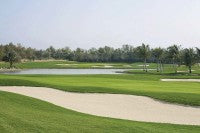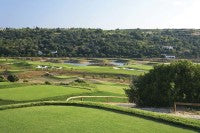Singing a different Troon!
With more and more golf courses appearing in areas previously thought to be uninhabitable, climate issues seem to be less of a concern when planning a new golf course development.
 This is particularly apparent in the arid desert regions such as Arizona or the Middle East where golf courses have become a major feature of the landscape. Likewise, gated communities, with golf courses of the highest quality, have been developed in Russia. And Egypt, now home to new five star golfing resorts, is fast becoming a popular golfing destination.
This is particularly apparent in the arid desert regions such as Arizona or the Middle East where golf courses have become a major feature of the landscape. Likewise, gated communities, with golf courses of the highest quality, have been developed in Russia. And Egypt, now home to new five star golfing resorts, is fast becoming a popular golfing destination.
Pitchcare caught up with leading agronomist Simon Doyle to discuss the impact that climate has on the agronomic practices and the intricacies involved in creating immaculate surfaces in such challenging climates.
Simon has a strong golfing background. Well travelled in his work with leading golf management company Troon Golf, he has been privy to a wide variety of golf courses across very different climates. The company's wide portfolio of over 200 developments in over 30 countries has given Simon, and his team of agronomists, the opportunity to sample almost every soil type, disease and drainage system, meaning they arrive at any facility with strategies and plans drawing on their 18 years experience of developing some of the world's finest golf courses and resorts.
Troon Golf facilities can be found in various climates and locations, from Arizona and Australia to Dubai and Portugal and, with such variety, comes an array of experiences. Knowledge on a regions propensity to host a type of golf course, how the climatic conditions may impact upon the playability and quality of surface and how to best overcome such issues lie at the heart of their agronomic strengths.
 As European Director of Agronomy, Simon is charged with delivering the company's philosophy of agronomy at all of their European developments, "to achieve agronomic excellence by utilising and improving upon reliable, proven techniques to create the most celebrated playing surfaces in the world".
As European Director of Agronomy, Simon is charged with delivering the company's philosophy of agronomy at all of their European developments, "to achieve agronomic excellence by utilising and improving upon reliable, proven techniques to create the most celebrated playing surfaces in the world".
He has travelled extensively to regions rich in golfing heritage as well as new regions unfamiliar to golfing afficionados. Having been involved in agronomy since a very young age, and first being involved with golf course development in his teens when his parents developed Glen of the Downs Golf Club in Ireland, he is more qualified than most to pass judgement on the agronomic challenges of a modern golf course, wherever in the world it might be.
Simon is responsible for providing the strategic direction of the company's agronomy operations across their European developments and, with a portfolio that has expanded into new, unexplored countries such as Russia, Simon and his team must remain versatile as they adapt not only to the changing conditions but also the changing climate.
"One of the biggest challenges we face is how we can use our previous experiences to help maintain standards. This requires everyone on the team to work towards delivering the same goal," says Simon, "and, when it comes to dealing with the extreme weather conditions, it's all about experience. One of the great things about the team I work with is that there is not one condition or problem that one of us has not had to deal with at some time. It's a great resource for all our people, our clients included."
Although the British summer, particularly in recent years, has offered drainage challenges to test even the best systems, agronomists in the UK are not alone in facing extreme conditions as elsewhere different, but equally challenging, conditions have been encountered.
 "One of the hardest challenges I have dealt with would be managing bentgrass in Japan, where the summers are 35-40°C with 90% humidity for extended periods. Physiologically, bentgrass cannot survive these combined extremes for very long, so we had to manipulate the situation through a combination of means. Coupling good air circulation, irrigation management and pest control strategies we were able to manage the surface and soil conditions and nurse the course through the challenging conditions.
"One of the hardest challenges I have dealt with would be managing bentgrass in Japan, where the summers are 35-40°C with 90% humidity for extended periods. Physiologically, bentgrass cannot survive these combined extremes for very long, so we had to manipulate the situation through a combination of means. Coupling good air circulation, irrigation management and pest control strategies we were able to manage the surface and soil conditions and nurse the course through the challenging conditions.
It's many sleepless nights but a great sense of achievement at the end of a long hot summer, and it's the experiences such as that which have been invaluable when dealing with the variety of extreme conditions we have faced at our European facilities this year."
"Bearwood Lakes and The Grove have barely turned on their irrigation systems this summer, while Navarino Dunes Golf Resort in Greece has faced very different challenges, with no rain at all falling between May and September end."
"On the continent we have experienced some opposite extremes to the UK, with very dry weather. At Castiglion del Bosco, a Tom Weiskopf design set in the rolling hills of Tuscany, Italy, construction started last spring. The dry weather meant no down days and, therefore, a lot of progress was made; a golf course contractor's dream!"
"Whilst, at Navarino Dunes Golf Resort in Greece, a very dry year was as much a hindrance as it was a help. The Course Superintendent, Gary Finnerty, had a busy summer keeping on top of the grow-in of the golf course. Long, hot, dry days placed an ever so important emphasis on monitoring green conditions throughout each day whilst ensuring the newly installed irrigation system was up and fully functional on time. Along with this, there was the requirement to regularly monitor water quality and, in particular, salt levels which was critical during the summer months."
In dealing with the variety of climatic extremes, and in particular the wet conditions faced in the UK this year, Simon believes experience is again the best tool to possess.
"We are getting much more used to the problems Mother Nature has been throwing at us of late, and so the recent poor weather has not been a big surprise. It has created its problems but we adapt and respond where necessary. One of the main areas of concern when there is such heavy rainfall is bunkers, as I am sure many superintendents will agree."
"The devastation heavy rainfall can have on bunkers, not to mention staff morale, is major. In response we are having to upgrade bunkers so they can withstand these extremes better. We do this by upgrading sub-surface drainage in the bunkers while at the same time installing liners.
Liners allow us to minimise the movement of sand during heavy rains and prevent contamination with the subgrade below; the former preventing the labour intensive task of replacing sand and the latter prolonging the useful life of the bunker sand."
Although Simon and his team face a variety of climates, soil types and growing conditions, they strive to deliver a consistently high standard of playing surface regardless. Advising and managing agronomic issues at each facility allows Simon to implement Troon Golf's agronomy standards, giving each development the same support structure which, in turn, creates synergies and consistency across every course under their umbrella.
 Facing a broad range of conditions and managing facilities at every stage of development, from the well established Oceânico Vilamoura courses in Portugal to the Agalarov Estates in Russia, which are due to open in 2009, the fundamentals remain consistent, and consistently delivering these ultimately leads to a consistently high end product.
Facing a broad range of conditions and managing facilities at every stage of development, from the well established Oceânico Vilamoura courses in Portugal to the Agalarov Estates in Russia, which are due to open in 2009, the fundamentals remain consistent, and consistently delivering these ultimately leads to a consistently high end product.
"There are obvious differences between the growing conditions in the UK when compared to the likes of Greece or Dubai but, at the end of the day, the fundamentals remain the same. The frequency and timing of the practices can differ but, ultimately, the emphasis remains on implementing sound irrigation, fertility and cultural practices."
The British weather continues to test agronomists resources year on year. However, some reassurance can be drawn from the fact that agronomists in the UK are not alone in having to deal with extreme and challenging conditions. Whether it is five months without rain as was experienced in Greece or a summer of record rainfalls, agronomists must remain versatile and adaptable to the challenges that will forever be present in the industry.
Encouragement can also be taken from the fact that experience is the most valuable tool for being better prepared to deal with the challenges that future seasons will undoubtedly present. With every challenge faced agronomists become more qualified and better prepared for the future.
